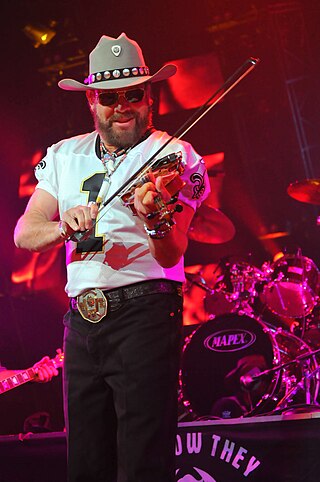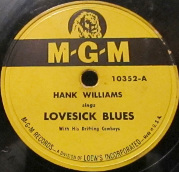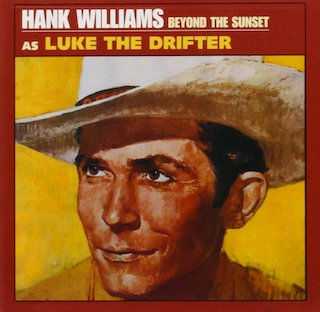Related Research Articles

HiramKing "Hank" Williams was an American singer-songwriter. He is regarded as one of the most significant and influential American singers and songwriters of the 20th century. Williams recorded 55 singles that reached the top 10 of the Billboard Country & Western Best Sellers chart, five of which were released posthumously, and 12 of which reached No.1.

Randall Hank Williams, known professionally as Hank Williams Jr. or Bocephus, is an American singer-songwriter and musician. His musical style has been described as a blend of rock, blues, and country. He is the son of country musician Hank Williams and the father of musicians Holly Williams and Hank Williams III, and the grandfather of Coleman Williams. He is also the half brother of Jett Williams.
Outlaw country is a subgenre of American country music created by a small group of iconoclastic artists active in the 1970s and early 1980s, known collectively as the outlaw movement, who fought for and won their creative freedom outside of the Nashville establishment that dictated the sound of most country music of the era. Willie Nelson, Waylon Jennings, Merle Haggard, Johnny Cash, Kris Kristofferson, and David Allan Coe were among the movement's most commercially successful members.
"Cold, Cold Heart" is a country music and pop song written and first recorded by Hank Williams. This blues ballad is both a classic of honky-tonk and an entry in the Great American Songbook.

"Hey, Good Lookin'" is a 1951 song written and recorded by Hank Williams, and his version was inducted into the Grammy Hall of Fame in 2001. In 2003, CMT voted the Hank Williams version No. 19 on CMT's 100 Greatest Songs of Country Music. Since its original 1951 recording it has been covered by a variety of artists.
"Move It On Over" is a song written and recorded by the American country music singer-songwriter Hank Williams in 1947.
"I'm So Lonesome I Could Cry" is a song written and recorded by American country music singer-songwriter Hank Williams in 1949. The song has been covered by a wide range of musicians.

"Lovesick Blues" is a Tin Pan Alley song, composed by Cliff Friend, with lyrics by Irving Mills. It first appeared in the 1922 musical "Oh, Ernest", and was recorded that year by Elsie Clark and Jack Shea. Emmett Miller recorded it in 1925 and 1928, followed by country music singer Rex Griffin in 1939. The recordings by Griffin and Miller inspired Hank Williams to perform the song during his first appearances on the Louisiana Hayride radio show in 1948. Receiving an enthusiastic reception from the audience, Williams decided to record his own version despite initial push back from his producer Fred Rose and his band.

"I Saw the Light" is a country gospel song written by Hank Williams. Williams was inspired to write the song while returning from a concert by a remark his mother made while they were arriving in Montgomery, Alabama. He recorded the song during his first session for MGM Records, and released in September 1948. Williams' version did not enjoy major success during its initial release, but eventually it became one of his most popular songs and the closing number for his live shows. It was soon covered by other acts, and has become a country gospel standard.
"White Lightning" is a song written by the rockabilly artist J. P. Richardson, best known by his stage name, the Big Bopper. The song was recorded by American country music artist George Jones and released as a single in February 1959. On April 13, 1959, Jones' version was the first number-one single of his career. The song has since been covered by numerous artists. Richardson never got to see the success of the record, as he had been killed in an airplane accident 6 days before its release.
This article includes an overview of the major events and trends in popular music in the 1950s.
"You Win Again" is a 1952 song by Hank Williams. In style, the song is a blues ballad and deals with the singer's despair with his partner. The song has been widely covered, including versions by Ray Charles, Jerry Lee Lewis, Roy Orbison, the Grateful Dead, Charley Pride, Bob Dylan, and the Rolling Stones.
"My Bucket's Got a Hole in It" is a song widely attributed to Clarence Williams, who obtained a copyright in 1933, although the melody was recorded under various names years earlier. The song became popular performed by Hank Williams for MGM and reached number 4 on the country chart in 1949.

"I Can't Help It (If I'm Still in Love with You)" is a song written and originally recorded by Hank Williams on MGM Records. It hit number two on the Billboard country singles chart in 1951. In his autobiography, George Jones printed the first six lines of the song and stated, "Its lyrics couldn't be more simple - or profound."
"My Sweet Love Ain't Around" is a song written and performed by Hank Williams. It was his third single on MGM Records released in January 1948.

Hank Williams as Luke the Drifter is an LP by Hank Williams released by MGM Records in 1953. It features narrations that Williams released under the pseudonym Luke the Drifter.
"California Zephyr" is a song written by Hank Williams. It was released as a single on MGM Records in 1956.
"Just One More" is a 1956 country music song by American artist George Jones. It was released as a single on Starday Records in 1956 reached #3 on the Billboard country singles chart. The song is often featured on his early compilation albums and was one of the most successful of his self-penned songs.
"Rockin' Chair Daddy" is a honky tonk country song written and recorded by Braxton Shuffert. Hank Williams was the co-writer.
Colin Escott is a British music historian and author specializing in early U.S. rock and roll and country music. His works include a biography of Hank Williams, histories of Sun Records and The Grand Ole Opry, liner notes for more than 500 albums and compilations, and major contributions to stage and television productions. Honors include multiple Grammy Awards and a Tony Award nomination.
References
- ↑ Escott, Colin (2004). Hank Williams: The Biography. Back Bay. pp. 291–292. ISBN 0-316-73497-7.